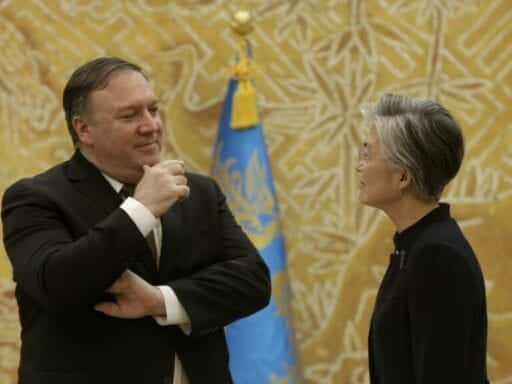What’s worse, South Korea could hurt ties with America — and help North Korea in the process.
For years, South Korea has imposed punishing economic sanctions on its neighbor, North Korea. But on Wednesday, South Korea signaled it’s willing to lift some of those sanctions. If it does so, it’s a growing sign that the US-led campaign to pressure North Korea into dismantling its nuclear arsenal is falling apart.
According to South Korean Foreign Minister Kang Kyung-wha, Seoul may consider lifting some sanctions to incentivize North Korea to stop developing its nuclear program. South Korea has placed financial penalties on the North, in part because of the improving nuclear program and also because North Korea killed 46 South Korean sailors in 2010.
Kang somewhat walked back her comments later in the day.
“The issue of lifting sanctions should be reviewed considering the situation of inter-Korean relations as a whole,” she told lawmakers.
However, Kang said nothing about nixing the broad financial penalties imposed on North Korea by the United Nations. But many of Seoul’s sanctions on Pyongyang overlap with the UN ones, South Korean officials told the New York Times on Wednesday, so reversing them would be more of a symbolic gesture.
As of now, it’s unclear if South Korea will actually act. But if it does, this move could actually harm the country’s relationship with the US in two ways.
First, it would underscore a massive rupture in how America and South Korea approach ending North Korea’s nuclear program. The Trump administration wants to keep squeezing Pyongyang financially as part of its “maximum pressure” campaign, so that it has no choice to but to give up nuclear development, even as President Donald Trump and North Korean leader Kim Jong Un share diplomatic niceties.
And second, the move could more broadly lead to a break in Washington-Seoul ties. One of North Korea’s greatest goals is to weaken the decades-long bond between the US and South Korea. If both countries don’t form a united front, it could cause political tension.
The US, for example, may not see South Korea as a trustworthy partner if it breaks ranks. South Korean President Moon Jae-in’s administration, meanwhile, might view Trump’s team as overly aggressive against North Korea and continue on its more dovish path without American support.
Thera are already signs of a split. Kang told South Korean lawmakers on Wednesday that Secretary of State Mike Pompeo is upset with the military pact Seoul and Pyongyang made in September. It was a rare admission of the small-yet-widening rift between the US and South Korea.
So South Korea’s announcement about potentially lifting sanctions probably makes North Korea happy for a variety of reasons.
“Kim Jong Un has masterfully followed the North Korean playbook to try and drive a wedge between the US and South Korea,” Robert Manning, a Koreas expert at the Atlantic Council think tank, told me. “This means that US and South Korean leverage is eroding and it would be extremely difficult to reimpose maximum pressure.”
South Korean progressives have acted like this before
Sung-Yoon Lee, a Koreas expert at the Fletcher School at Tufts University, told me this is how South Korea has previously dealt with sanctions toward North Korea.
“South Korea views itself an exception to international law and norms,” he said. “What [South Korean Foreign Minister] Kang said, as clumsy and undiplomatic as it was, was not revelatory.” Rather, he said, Seoul finds ways to flow money into North Korea despite crushing sanctions — thereby helping Kim’s regime in the process.
Here’s just one example: Despite myriad sanctions on Pyongyang, Seoul gave $8 billion in aid to its northern neighbor from 1998 to 2008. About half of that money came from former South Korean President Roh Moo Hyun’s administration from 2003 to 2008, Lee told me.
Roh, a South Korean progressive who advocated for closer ties to North Korea as part the so-called “Sunshine Policy,” was the current President Moon’s boss. South Korean conservatives, on the other hand, prefer a harder-line approach toward Pyongyang.
It seems Moon is continuing a longstanding progressive policy of trying to improve bilateral ties between Koreas. It hasn’t worked yet — and it’s unclear if it will work now.
“Maximum pressure” is failing
Even before Seoul’s announcement, Trump’s “maximum pressure” campaign — isolating North Korea economically and diplomatically until it dismantles its nuclear program — has started to crumble.
Trump met with Kim, North Korea’s somewhat reclusive leader, in June in Singapore. That’s led to months of diplomacy between the two countries during which both leaders “fell in love,” according to Trump.
That improved relationship, in part, has led the US to soften its hardline approach toward North Korea. That’s given China and Russia, two of North Korea’s top allies, the space to relax their sanctions and kick-start trade with Pyongyang, giving North Korea an economic lifeline.
And on Wednesday, Beijing said Moscow and Pyongyang would soon advocate for removing some of the UN sanctions on North Korea. They must sense an opportunity to get Pyongyang a little relief.
North Korea’s economy is by no means free of pressures, and Washington still says it wants to see the end of Pyongyang’s nuclear program soon before lifting any sanctions. But the economic pain plan appears near death — and South Korea may soon put the final nail in the coffin.
Author: Alex Ward



